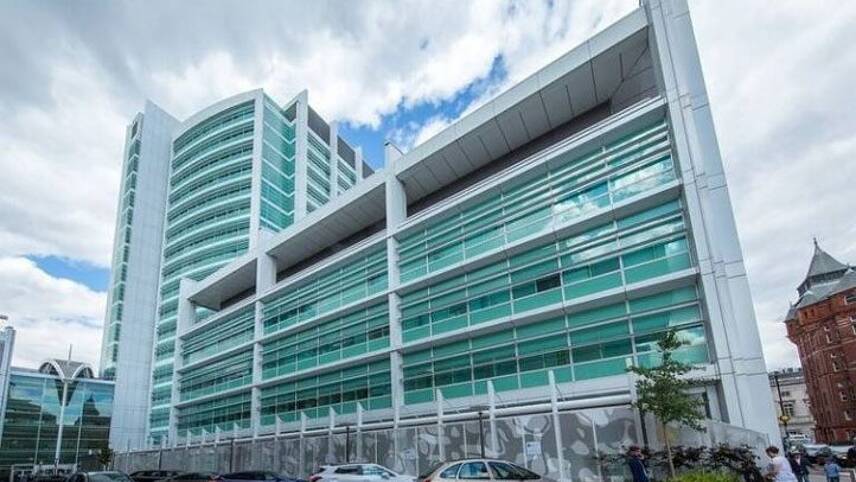Register for free and continue reading
Join our growing army of changemakers and get unlimited access to our premium content

Image: UCL
The net-zero ambition is backed with a 10-point plan for delivery which targets the Foundation Trust’s most-emitting activities, including staff commuting, patient journeys and energy use in buildings.
To this latter point, the plan contains a specific target for Scope 2 (power-related) emissions – namely an 80% reduction within a decade. The Foundation Trust will switch to 100% renewable electricity to help deliver this reduction. It has signed a 100% renewable tariff with Haven Power but is also planning to increase onsite generation using rooftop solar panels. There are also measures to further improve energy efficiency by switching to LED lighting.
On transport-related emissions, staff will be surveyed to ascertain how they are travelling to and from work. Additionally, existing bike user groups and a pedometer challenge, which support cycling and walking, will receive increased promotion. Teams will also be encouraged to join new programmes which reward them for active transport and other low-carbon behaviour, with 17 teams signed up so far.
Additionally, the Foundation Trust has set a target to continue hosting 50% of its appointments virtually. It estimates that virtual appointments have saved more than 14 million miles of travel in the past 12 months.
Also detailed in the plan are measures to tackle emissions from anaesthetics, resources and waste.
There is a target to reduce the use of the highest-emission anaesthetic gases by 90%. In a statement, the Foundation Trust said: “The worst offending greenhouse gases in anaesthetics, particularly Desflurane, will no longer be used and the use of lower-footprint intravenous anaesthetics will be increased to move away from inhaled gases.”
As for resources and waste, the plan includes measures to decrease waste incineration; decrease disposable cup and cutlery use by staff and patients and procure lower-carbon products. All procurement deals will include a 10% weighting for environmental sustainability. 62% of NHS England’s emissions footprint is estimated to lie within its supply chain.
The Foundation Trust has forged a string of partnerships to assist with the delivery of the plan. Facilities management firm Mitie, which has a 2025 net-zero target for its own operations, is the Foundation Trust’s long-standing service partner. Additionally, Camden Council and NGO Global Action Plan are helping to deliver programmes that reduce air pollution as well as emissions, on the transport side of things. Work here includes running green travel workshops with staff.
“Spurred on by the NHS’s drive to reach net-zero by 2040 and delivering an 80% reduction by 2028 to 2032, we at UCLH have a plan, but will go further and faster, aiming to be net-zero within ten years – by 2031,” said the Foundation Trust’s director of innovation Luke O’Shea.
“The plan aims to give clear focus to practical, achievable things we can do now that will have a major impact on our footprint. Some of these 10 action points will also save the NHS money; for example, LED lights pay back in under three years, waste is a huge cost to trusts, and solar panels will become income-generating in around 10 years.”
The plan is backed up by a climate and health emergency declaration, which sees the Foundation Trust acknowledging the ways in which global temperature increase and changing weather patterns are already affecting public health.
Solar panels for prisons
In other news relating to decarbonising the UK’s public sector, the Ministry of Justice has this week announced plans to install more than 16,000 new solar panels across 19 UK prisons.
HMP Bullingdon, HMP Erlestoke and HMP Wayland will be the first locations to receive the solar panels, which will be rooftop-mounted. At these locations, arrays will be in place by the end of 2021. The remaining 16 locations will undergo installation from spring 2022.
Each solar array is expected to provide 20% of its prison’s electricity, reducing Scope 2 emissions at each location by some 1,300 tonnes annually. The Government is spending £12m on the solar project and is forecasting an £80,000 decrease in annual electricity bills once all 19 arrays are installed.
The announcement of the scheme comes after a confirmation that the current administration’s planned new prisons will be designed to produce no operational emissions. The four locations will be fitted with solar panels and heat pumps and designed to maximise energy efficiency. All four facilities. The Ministry of Justice is applying for BREEAM certification for all four prisons.
Sarah George


Please login or Register to leave a comment.